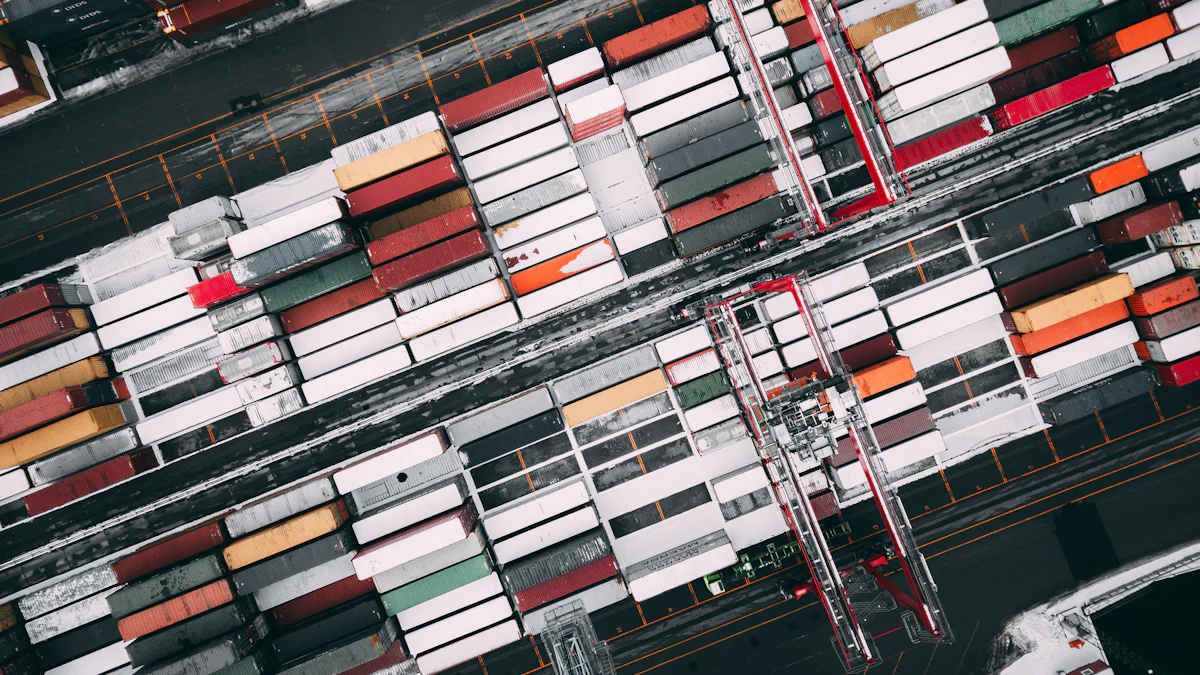The Trends for Sustainable Logistics over the Next ten Years

In the realm of logistics, the emphasis on sustainable logistics has been steadily increasing. Companies are actively seeking ways to reduce their carbon footprint and mitigate environmental impact. This shift towards eco-friendly practices is not merely a passing trend; it has become a fundamental necessity in the industry. By investing in green technologies and optimizing operations, businesses aim to substantially decrease greenhouse gases and pollution. The commitment to sustainability is paving the way for more environmentally conscious operations over the next decade.
Key Drivers for Sustainable Logistics
Environmental Regulations
Government policies and international agreements
Various government policies and international agreements drive the adoption of sustainable practices in logistics operations.
Key Regulations for Sustainable Logistics mandate reductions in transport emissions to meet climate targets.
Companies must cut carbon emissions by 55% by 2030 compared to 1990 levels.
Corporate sustainability goals
Corporate sustainability goals play a vital role in promoting environmental sustainability in logistics operations.
Driven by government regulations, consumer demand for eco-friendly products, and cost savings associated with sustainable practices.
Technological Advancements
Automation and AI
Automation and AI innovations are revolutionizing sustainable logistics operations.
These advancements enhance operational efficiency and reduce environmental impact through intelligent systems.
Internet of Things (IoT)
The Internet of Things (IoT) integration is reshaping the logistics industry towards greener practices.
IoT technologies enable real-time monitoring, optimizing routes, and resource utilization for sustainable outcomes.
Consumer Demand
Shift towards eco-friendly products
Consumer demand is steering the logistics sector towards eco-friendly product transportation.
The rising preference for sustainable goods influences companies to prioritize green supply chain solutions.
Increased awareness and expectations
Heightened awareness among consumers drives the demand for environmentally conscious logistics services.
Meeting these expectations requires innovative approaches that align with sustainable practices.
Emerging Trends in Sustainable Logistics

Green Transportation Solutions
In the realm of sustainable logistics, the adoption of electric and hybrid vehicles is gaining momentum. These vehicles offer a greener alternative to traditional fuel-powered transportation, significantly reducing carbon emissions and promoting environmental sustainability. The integration of electric and hybrid vehicles into logistics operations aligns with the industry's commitment to eco-friendly practices.
Moreover, the utilization of alternative fuels presents a promising solution for sustainable transportation. By shifting towards renewable energy sources such as biofuels or hydrogen, logistics companies can further minimize their carbon footprint and contribute to a cleaner ecosystem. The implementation of alternative fuels not only reduces dependency on fossil fuels but also fosters innovation in green energy solutions within the logistics sector.
Efficient Supply Chain Management
Efficiency lies at the core of sustainable supply chain management. The optimization of routes and loads plays a crucial role in enhancing operational efficiency while reducing environmental impact. By streamlining transportation routes and maximizing load capacities, logistics companies can achieve cost savings and minimize greenhouse gas emissions. This strategic approach ensures resource optimization and promotes sustainable practices throughout the supply chain.
Furthermore, the integration of big data and analytics revolutionizes decision-making processes in logistics operations. Leveraging advanced analytics tools enables companies to gain valuable insights into their supply chain performance, identify areas for improvement, and make data-driven decisions that prioritize sustainability. The use of big data enhances operational transparency, facilitates informed decision-making, and drives continuous improvement in sustainable supply chain management.
Sustainable Packaging
The shift towards biodegradable and recyclable materials marks a significant trend in sustainable packaging within the logistics industry. Companies are increasingly embracing eco-friendly packaging solutions to reduce waste generation and promote circular economy principles. Biodegradable materials decompose naturally over time, minimizing environmental impact and supporting waste reduction initiatives across the supply chain.
Additionally, the adoption of minimalist packaging designs underscores a commitment to sustainability by optimizing material usage and reducing excess packaging waste. Minimalist designs prioritize functionality while minimizing environmental footprint, aligning with consumer preferences for eco-conscious products. By embracing minimalist packaging approaches, logistics companies can enhance efficiency, reduce costs, and contribute to a more sustainable future.
Innovations Shaping the Future

Smart Warehousing
Implementing smart warehousing solutions involves integrating automated storage and retrieval systems to enhance operational efficiency. The use of advanced technologies like robotics and AI optimizes warehouse processes, leading to improved inventory management and order fulfillment. Retailers worldwide are increasingly investing in smart warehousing solutions to streamline operations and meet evolving customer demands.
Automated storage and retrieval systems
Adoption of automated storage and retrieval systems streamlines warehouse operations by automating inventory handling processes.
Implementation of robotic systems enhances picking accuracy and accelerates order processing, improving overall warehouse productivity.
Integration of AI-powered technologies enables real-time data analysis for efficient resource allocation and inventory optimization.
Energy-efficient warehouse designs
Embracing energy-efficient warehouse designs reduces environmental impact while cutting operational costs.
Utilization of sustainable building materials and energy-saving technologies promotes eco-friendly practices within warehouse facilities.
Implementation of renewable energy sources such as solar panels contributes to a greener supply chain ecosystem.
Blockchain Technology
The integration of blockchain technology revolutionizes transparency and traceability in logistics operations. By leveraging blockchain's decentralized ledger system, companies can securely track the movement of goods across the supply chain, ensuring authenticity and reliability. This innovative technology enhances data security, minimizes fraud risks, and fosters trust among stakeholders.
Enhanced transparency and traceability
Blockchain technology ensures end-to-end visibility by recording transactional data in secure blocks that cannot be altered.
Implementation of blockchain-based platforms enables seamless tracking of product origins, certifications, and compliance documentation.
Enhanced transparency through blockchain builds trust with consumers by providing verifiable information on product authenticity.
Reduction of fraud and errors
The immutability feature of blockchain prevents unauthorized alterations or tampering with critical supply chain data.
Reduction in fraudulent activities due to transparent record-keeping mechanisms ensures integrity throughout logistics processes.
Error reduction is achieved through automated verification protocols embedded within blockchain networks.
Collaborative Logistics Platforms
The emergence of collaborative logistics platforms facilitates shared resources and infrastructure among multiple stakeholders in the supply chain. These platforms promote synergy through collaborative efforts, optimizing resource utilization while reducing operational redundancies. Companies like JUSDA exemplify successful collaboration models that drive efficiency and sustainability across diverse logistics networks.
Shared resources and infrastructure
Collaborative logistics platforms enable sharing of transportation assets, warehouses, and distribution centers among partner organizations.
Pooling resources collectively reduces costs associated with underutilized capacities while promoting sustainable practices.
Shared infrastructure fosters a culture of cooperation, enhancing operational agility in response to dynamic market demands.
Examples of platforms like JUSDA
JUSDA's collaborative platform integrates advanced technologies for efficient cross-border trade services.
Leveraging shared resources through JUSDA's platform optimizes supply chain solution, minimizing environmental impact.
JUSDA's commitment to sustainable logistics underscores the importance of collaborative partnerships in shaping the future of environmentally conscious supply chains.
Impact of Sustainable Logistics Trends
Environmental Impact
Reduction in carbon footprint
Companies implementing sustainable logistics practices significantly reduce their carbon footprint by optimizing transportation routes and embracing green energy solutions.
The adoption of alternative fuels and energy-efficient modes of transportation plays a pivotal role in minimizing emissions and promoting environmental sustainability within the supply chain.
By reducing carbon emissions, businesses contribute to a healthier ecosystem and combat climate change effectively.
Conservation of natural resources
Sustainable logistics initiatives focus on conserving natural resources through efficient resource management and waste reduction strategies.
Companies prioritize the use of recyclable materials, minimize packaging waste, and promote circular economy principles to preserve valuable resources for future generations.
The conservation of natural resources not only benefits the environment but also ensures long-term sustainability in logistics operations.
Economic Impact
Cost savings and efficiency gains
Sustainable logistics trends drive cost savings and efficiency gains for companies by streamlining operations and optimizing resource utilization.
Efficient supply chain management practices, such as route optimization and load consolidation, lead to reduced operational costs and enhanced productivity.
By embracing sustainable practices, businesses unlock financial benefits while contributing to a more sustainable future for the industry.
Long-term financial benefits
The long-term financial benefits of sustainable logistics extend beyond immediate cost savings to create a resilient business model that aligns with evolving market demands.
Companies investing in sustainable technologies and practices secure competitive advantages, attract environmentally conscious consumers, and foster innovation within the industry.
The integration of sustainability into core business strategies ensures sustained profitability and growth opportunities in the dynamic logistics landscape.
Social Impact
Improved public health and safety
Sustainable logistics initiatives have a positive impact on public health by reducing air pollution, traffic congestion, and noise levels associated with traditional transportation methods.
Cleaner transportation modes enhance air quality, promote safer road conditions, and contribute to overall well-being in communities where logistics operations are present.
Improving public health through sustainable logistics practices fosters healthier living environments for individuals across diverse regions globally.
Enhanced corporate reputation and customer loyalty
Companies prioritizing sustainability build a strong corporate reputation based on ethical business practices, environmental stewardship, and social responsibility.
Consumer trust is reinforced as businesses demonstrate commitment to eco-friendly initiatives that benefit society at large.
Enhanced corporate reputation leads to increased customer loyalty, brand recognition, and market competitiveness in an era where sustainability is paramount for consumer preferences.
Sustainable logistics integrates environmentally friendly methods throughout the supply chain, championing resource efficiency and eco-conscious innovations.
Enhancing energy efficiency, cutting down waste, utilizing sustainable packaging, and fostering ethical partnerships are vital components of sustainable logistics practices.
Sustainability should operate in a self-sustaining way and be regulated through natural means to ensure long-term environmental benefits.
The social implications of adopting green logistics practices are profound, leading to improved public health outcomes and enhanced quality of life for communities.
Prioritizing sustainability can strengthen community relations, build a positive brand image, and increase customer loyalty in the evolving landscape of environmentally conscious supply chains.
See Also
5 Key Trends Shaping Future Supply Chain Efficiency
Unraveling Logistics Risk Trends: The Impact Revealed
Mastering Sustainable Supply Chain Transportation Strategies
